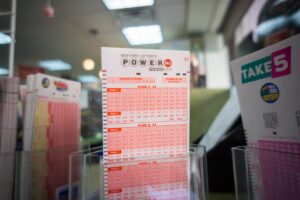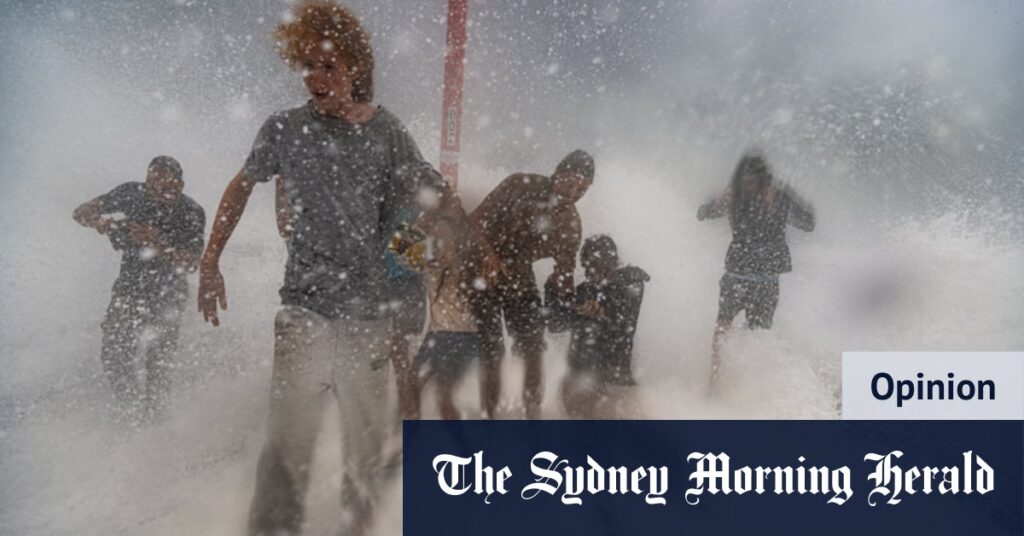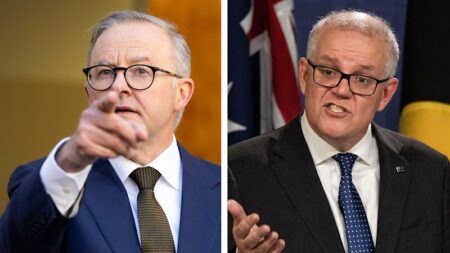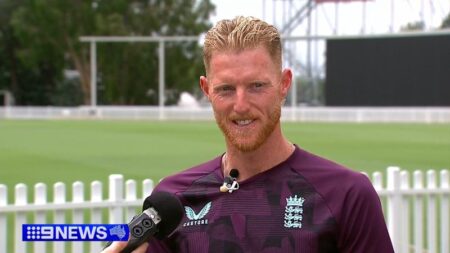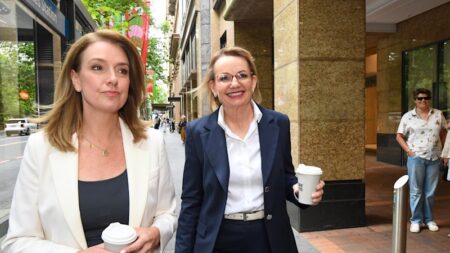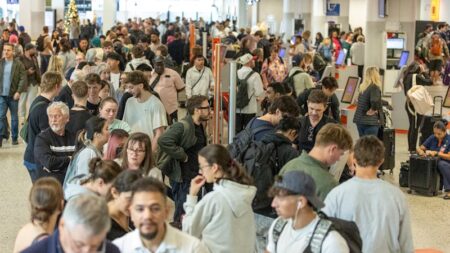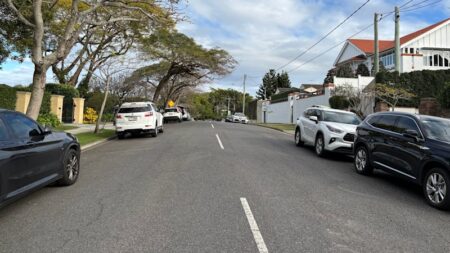Labor’s proposed 62 to 70 per cent emissions reduction by 2035 is timid and unsafe for everyday Australians. Consistent with more than 2 degrees of warming, it falls short of the Climate Change Authority’s advised range of 65 to 75 per cent, and far below the Climate Council’s warning that the science demands net zero by 2035 (“Ley’s quest for a net zero sum game”, September 19). In what other sphere of life would we allow our leaders to shrug off expert advice so casually?
Anthony Albanese’s 2035 world is one where coral reefs are gone, properties are uninsurable, heatwaves, bushfires and floods are routine and the economic toll compounds year after year. That is not a future in which Australia can prosper – and it is not a future any of us should be asked to accept. Sarah Brennan, Hawthorn
Waves caused by Cyclone Alfred hitting a rockwall at Brunswick Heads.Credit: Nick Moir
While 62 per cent is inadequate as an emissions reduction target, 70 per cent puts us in range of net zero by mid-century. The way forward is now clear: we must aim for the upper end of the target, not the lower; we must insist that the target be reached via actual cuts in emissions, not carbon offsets or dodgy accounting practices; and we must pressure the ALP to take a higher target to the next election. If we can do those three things, we can turn a weak target into something closer to what is needed. Ken Enderby, Concord
I would really like to know what the vision of Matt Canavan, Tony Abbott and Andrew Hastie is for Australia’s future. Everything they seem to want relates to Australia 75 years ago. Coal, coal and more coal. More and more pollution on our streets and in our cities; can’t possibly have clean cars. Let’s not accept anything from the scientific world. I half expect them to want to go back to child labour in the mines (it was cheaper) and take the vote away from women (that would save them a few headaches). Just let us know what your vision for Australia’s future is, apart from climate disaster. Peggy Fisher, Manly
The Coalition’s attack on Labor’s net zero 2050 is like that of a cacophony of cockies, each and every member dutifully repeating the sloganised media talking points, accusing Labor of “damaging the economy” and “how much is it going to cost the nation?” If they had a scintilla of connecting neurons, the real question would be: What is the cost to the nation, and how much will the economy be damaged if we don’t achieve net zero by 2050? Tony Lewis, Mount Victoria
What a calamitous climatic rollercoaster week it’s been. The environment minister follows the PM’s return from the Pacific island leaders’ forum last week with his approval of exactly what those leaders dread; 50 more years of Australia’s gas adding to their woes.
Then minister Bowen finally releases Australia’s climate risk assessment; forecasting “high” to beyond “severe” risks in every one of Australia’s key systems by 2050. It would be laughable if it weren’t so serious. Timed to support Bowen’s Goldilocks 2035 target for domestic emissions, announced on Thursday; a 62 to 70 per cent reduction. Not too hot to burn the fingers of our fossil fuel economy, but apparently not cool enough to avoid any of the forecast calamities. And when will our growing fossil fuel exports even get into the equation? Isn’t it time for Australia to decide which is more important – the money or the children? Tom Hunt, Oak Flats
Sussan Ley has casually dismissed hundreds of pages of detailed work by Treasury, the Climate Change Authority, the CSIRO and others because Anthony Albanese once promised a $275 reduction in electricity bills. While we are heading down the memory hole, I recall that around that time, the Coalition hid a report from the Australian public that clearly stated electricity prices would rise due to the price of gas despite the promises made and the taxpayer funds that went into their “gas-led recovery”. Now it is dishonestly trying to blame renewable energy. The Coalition has zero credibility on electricity pricing. Graeme Finn, Campsie
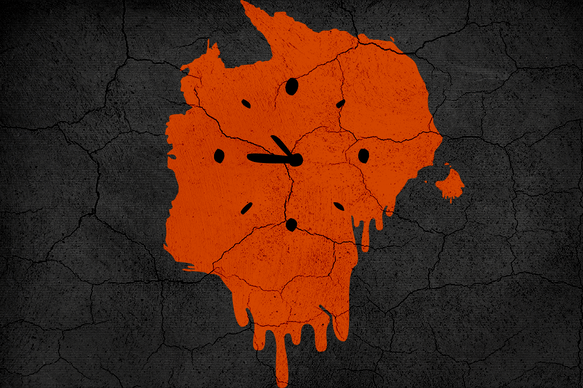
The clock is ticking on Australia’s climate change response.Credit: Marija Ercegovac
Not that further evidence was needed, but the latest modest climate targets emphasise that major reform is not a priority for an Albanese-led government. It’s rather a bit of policy tinkering at the edges that minimises voter blowback, which coupled with an inept opposition sets up a minimum three terms, if not more. It’s a similar story with housing, budget repair, levels of debt and boosting productivity, the result being a mountain of rubbish that will have to be cleaned up further down the track, by which stage the current lot will be basking in a self-congratulatory glow in retirement. Mike Kenneally, Manly
Regarding the article on climate change targets, one thing stands out: the slow adoption of zero emission vehicles. When a fossil fuel-powered vehicle is sold, CO2 emissions are locked in for decades to come, barring some huge advances in fuel technology. Sure, it is going to take some time to phase out existing fossil fuel vehicles. But let’s mandate, with immediate effect, that all new cars, trucks and buses are zero emission, other than vehicles already on a ship. The existing pool of fossil fuel-powered cars should last long enough for the infrastructure to be upgraded for zero emission cars. Rasmus Torkel, Rockdale
The single biggest thing the government can do for climate change alleviation is to subsidise EV sales. The typical commute is less than 100km (round trip). A typical EV has a battery supporting a 400km range at 20 kWh per 100km. Such a vehicle, charged during the day from solar, could easily deliver the 10-20 kWh needed by the owner’s house in the evening peak. Car-to-grid technology gives a double win: reducing transport pollution while removing household energy demand. The government should be giving EVs away rather than taxing them. China has a huge overcapacity in EV production. We should be jumping on this as a national priority. Alan Stanley, Upper Corindi
Here’s a cheap and quick idea for reducing transport emissions; promote active transport. At present, we spend only 90¢ per person per year on active transport. Taking a few bucks away from the $714 each we all pay for roads will make a huge difference – while making us healthier and happier. Tim Hand, Balmain
Australia needs firm stand on Israel
Chris Sidoti delivers compelling arguments for declaring Israel’s behaviour as genocide and provides the necessary imperatives for how Australia needs to respond (“Australia’s already legally culpable, genocide label or not”, September 19). Our government needs to decide whether it wants to be a lukewarm opponent of what’s happening in Gaza or an unequivocal participant of resistance to what is unfolding. Israel doesn’t seem to give two hoots about world condemnation, but it might care if there are real economic consequences for its actions. The effective sanctioning of apartheid South Africa set a precedent for what can be done. Alexander Lane, Thornleigh
Chris Sidoti claims that Australia and other countries are legally obliged to implement actions against Israel to prevent genocide, an obligation triggered by the International Court of Justice (ICJ) finding there was an “existing plausible risk of genocide in Gaza”.
However, that’s not what the ICJ decided, according to no lesser expert than the court’s President, Justice Joan Donoghue. She appeared on the BBC program HARDtalk on April 28, 2024 and explained, “the court decided that the Palestinians had a plausible right to be protected from genocide, and that South Africa had the right to present that claim… it didn’t decide that the claim of genocide was plausible.”
So by Sidoti’s own argument, Australia has no obligation to act against Israel.
The genocide allegation doesn’t stack up anyway. Israel’s actions in warning civilians to flee before bombing buildings, and evacuating them to safe zones away from the fighting are the exact opposite of what forces bent on exterminating a people would do. And no genocide perpetrators have ever offered to stop the fighting as soon as the other side surrenders. Jamie Hyams, Australia/Israel and Jewish Affairs Council
Kimmel cutdown
What “bad thing” did Jimmy Kimmel actually say (“Kimmel crossed a line, but America has crossed a bigger one”, September 19)? Apparently, his comments were “offensive and insensitive”. Which might have made sense, and his sacking possibly justified, if his comments had been about Charlie Kirk. But they weren’t.
If you look closely at his comments, all that he was implying was that the shooter was MAGA. All of which confirms that the real motivation for Kimmel’s sacking is to grease the wheels of a potential business merger and to curry favour with the current administration.
And Trump and his administration are clearly trying to stifle any criticism of them. In that context, more should be made of Barack Obama’s comments; “This is precisely the kind of government coercion that the First Amendment was designed to prevent”. The whole point of free speech was to prevent tyrannical governments from silencing the voice of the people. The sacking hasn’t yet been litigated, but it would be interesting to find out what a fundamentalist Supreme Court thought of it, even with a conservative 6-3 leaning.
If American patriots haven’t realised it yet, this is precisely why America was established in the first place. David Rush, Lawson
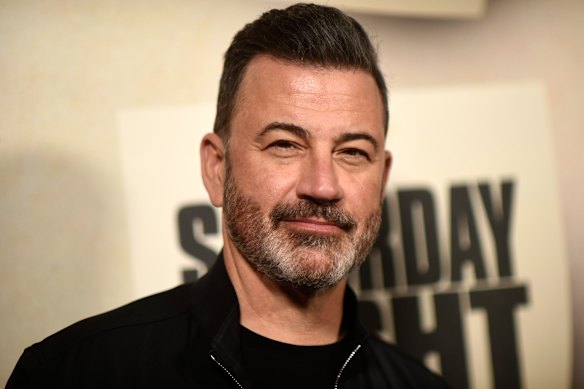
Jimmy Kimmel’s popular show was taken off the air after his remarks about Charlie Kirk’s alleged killer.Credit: Richard Shotwell/Invision/AP
Both the right and the left are keen to blame the murder of Charlie Kirk on the ideology of their political opponents. As details emerge, it shouldn’t surprise us if, instead of a steely political warrior, Tyler Robinson turns out to be a mixed-up kid whose personal turmoil reflects his nation’s existential divide. Colin Stokes, Camperdown
As the US becomes less and less a democracy and careers towards becoming in effect an authoritarian one-party state, which is clearly what the Republicans intend, it is not inconceivable that at some point in the future we will reach the conclusion that we have more in common with China than with our erstwhile ally.
China, like us, tries to protect its people from gun violence and infectious diseases, and in trying to protect the planet from the impacts of climate change, we have far more in common with China, where emissions are falling, than with the US and its “drill, baby, drill” president. Now that will add a further complication to our already difficult foreign policy decision-making. Martin Mansfield, Baulkham Hills
We need not shed many tears for Jimmy Kimmel. He has the financial security to survive unemployment while enjoying new status as a free speech martyr. But spare a thought for the scores of his writers, producers, directors and production staff who’ve also now lost their jobs. Is Donald Trump gloating over their sackings too? David Salter, Hunter’s Hill
Democracy rules!
While “emphatic, non-negotiable condemnation” may not be the answer, I would like to see Waleed Aly attempt to change the minds and purposes of Trump and Netanyahu “through restraint, patience [and] the discipline to deal fairly” (“Violence made licit as US splinters”, September 19). Good luck with that, Waleed. Alynn Pratt, Grenfell
In a world of increasing violence, division and autocracy, we should all be thankful that we have a peaceful, healthy democracy, independent judiciary and press that can inquire without prejudice or coercion and a wealth of talent from our multicultural society, exemplified by Gout Gout sprinting down the track and a prime minister of Italian heritage raised by a single mother in public housing.
And that I can write to a national paper and have my opinions published without fear or favour. Where else would you rather live? Rowan Godwin, Rozelle
Cost of ‘living’
At first glance at your article, it seemed a step forward that women can now freely express a preference for pursuing a career over having children (“Maybe no baby: Australian couples ditch traditional values about family, work and marriage”, September 19). Further reading, however, indicating the main cause is the cost of housing and childcare, elicits great sadness that many couples, rather than having a choice, now feel financially forced to forgo the pleasures of children, grandchildren and great-grandchildren. Heather Johnson, West Pennant Hills
Is it cold in there?
In your otherwise excellent weather round-up, why don’t you give the Sydney water temperatures? As summer nears, I need to know when I can dip my toe in, and I’m not the only one. Bernard Bradney, Kurraba Point
Postscript
The two big stories on the letters pages this week were the National Climate Risk Assessment and the Trump v John Lyons match. These were then intertwined with more about Senator Jacinta Nampiljinpa Price and the War Memorial judges disallowing Chris Masters’ book about Ben Roberts-Smith from the Les Carlyon Literary Prize, both worthy runners-up.
The climate assessment brought much eye-rolling and “we told-you-so-ing” at the news that Australia needs to do something about reducing emissions. As the letter writers have been saying for years, they would like to point out. Some writers wanted to go carefully and let the government work out what to do; others wanted it done years ago, but almost all agreed that it had to be done. The outliers were the regular “climate change is nonsense” group, but some years ago, the Herald announced that no more anti-climate change letters would be published, so don’t take it personally if you aren’t appearing.
As for the POTUS claiming “a rude foreign Fake News loser” (ie John Lyons) was hurting Australia and that Donald Trump was going to “tell on him” to Anthony Albanese, well, Washington could probably have heard the mockery all the way from here. Letter writers told the president exactly what they thought of him and his squealing rat fink threats, and it wasn’t polite. Some writers thought perhaps the journalist had gone too far, but, overall, writers thought he was doing his job properly and that certain overly sensitive presidents could pull their heads in and take this as a lesson in what democracy and free speech should be.
Price was a run-on from last week, and writers were still scathing about her, what they saw as her carrying-ons and her pretensions of one day being prime minister.
The Masters affair with the Australian War Memorial prompted many letters as well. Writers were very cross, feeling that the AWM has lost its direction and seemed to want to glorify war rather than doing its proper job of holding the memory of what men and women do in war, and what war is.
Harriet Veitch, Acting letters editor
- To submit a letter to the Sydney Morning Herald, email letters@smh.com.au. Click here for tips on how to submit letters.
- The Opinion newsletter is a weekly wrap of views that will challenge, champion and inform. Sign up here.
Read the full article here



